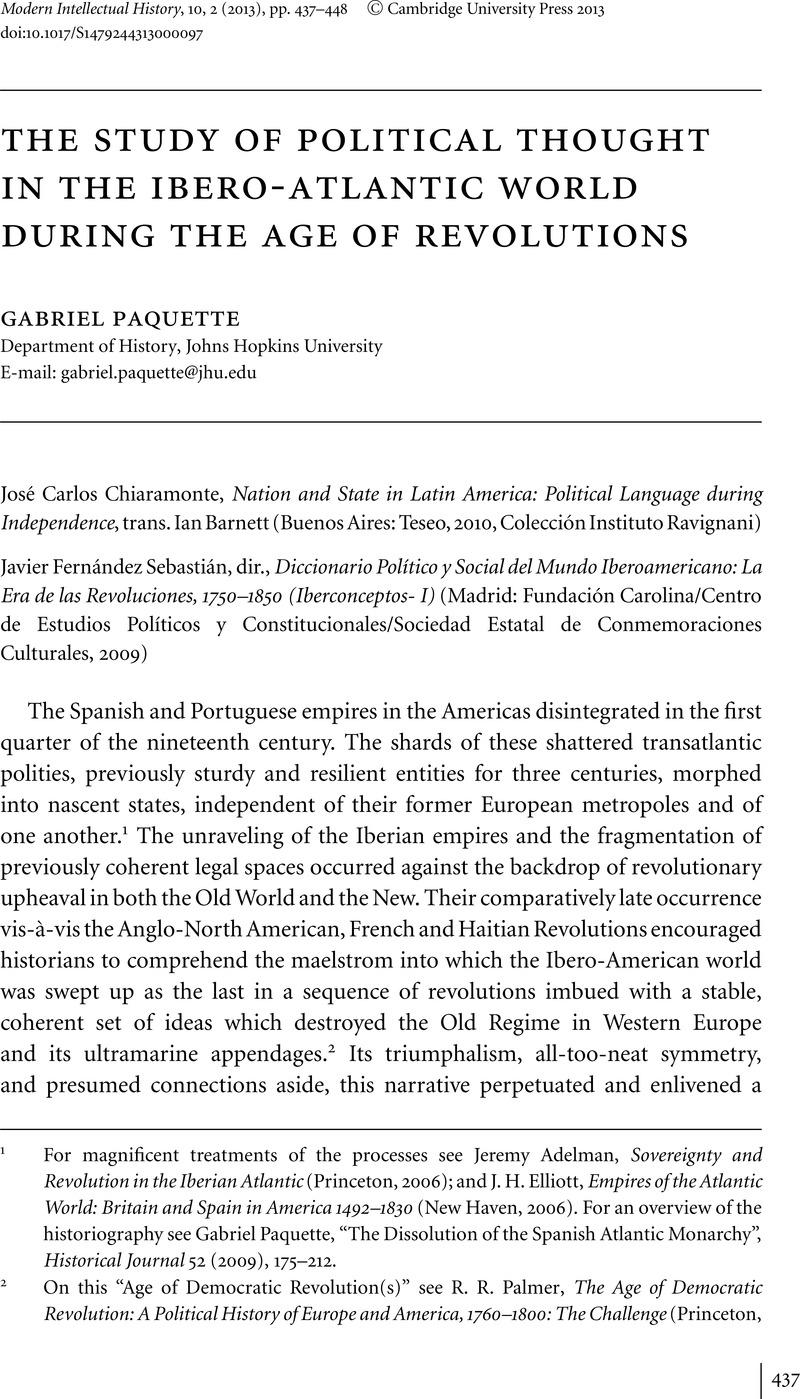Published online by Cambridge University Press: 11 July 2013

1 For magnificent treatments of the processes see Adelman, Jeremy, Sovereignty and Revolution in the Iberian Atlantic (Princeton, 2006)Google Scholar; and Elliott, J. H., Empires of the Atlantic World: Britain and Spain in America 1492–1830 (New Haven, 2006)Google Scholar. For an overview of the historiography see Paquette, Gabriel, “The Dissolution of the Spanish Atlantic Monarchy”, Historical Journal 52 (2009), 175–212Google Scholar.
2 On this “Age of Democratic Revolution(s)” see Palmer, R. R., The Age of Democratic Revolution: A Political History of Europe and America, 1760–1800: The Challenge (Princeton, 1959)Google Scholar; for a reappraisal of the epoch see Armitage, David and Subrahmanyam, Sanjay, eds., The Age of Revolutions in Global Context, 1760–1840 (London, 2010)CrossRefGoogle Scholar.
3 This 2010 book is the English translation of Chiaramonte's Nación y Estado en IberoAmérica: El Lenguaje Político en tiempos de las Independencias (Buenos Aires, 2004).
4 On these themes see the essays in Paquette, Gabriel, ed., Enlightened Reform in Southern Europe and Its Atlantic Colonies, c.1750–1830 (Farnham, 2009)Google Scholar.
5 Sebastián, Javier Fernández and Fuentes, Juan Francisco, “Introducción”, in Fernández Sebastián and Fuentes, dirs., Diccionario Político y Social del Siglo XIX Español (Madrid, 2002), 26–30passimGoogle Scholar.
6 Fernández Sebastián, in Gabriel Entin and Jeanne Moisand, “The Iberian-American Alphabet of Political Modernity: Interview with Javier Fernández Sebastián”, trans. Mark Hounsell, Books and Ideas (booksandideas.net), 10 June 2011, 2.
7 Ibid., 6.
8 Sebastián, Fernández [Javier Fernández Sebastián], “Intellectual History and Democracy: An Interview with Pierre Rosanvallon”, Journal of the History of Ideas, 68 (2007), 715Google Scholar.
9 Fernández Sebastián, in Entin and Moisand, “The Iberian-American Alphabet of Political Modernity”, 5.
10 Ibid., 9; nevertheless, Fernández Sebastián has organized the Diccionario along national lines. He laments this decision, but claims that there were few alternatives: “given that the academic world is divided by national borders, and historical archives as well, we had little option other than organize the project into countries”. Ibid., 5.
11 Ibid., 3–4; for an overview of these “connections after colonialism” see Brown, Matthew and Paquette, Gabriel, “The Persistence of Mutual Influence: Europe and Latin America in the 1820s”, European History Quarterly 41 (2011), 387–96Google Scholar.
12 Fernández Sebastián, “Intellectual History and Democracy”, 711.
13 For the most explicit effort to bring these two methodological approaches into dialogue see Richter, Melvin, The History of Political and Social Concepts: A Critical Introduction (Oxford, 1995)Google Scholar, esp. chap. 6, “Pocock, Skinner and Begriffsgeschichte”.
14 Sebastián, Fernández, “Conceptual History, Memory and Identity: An Interview with Reinhart Koselleck”, Contributions 2 (2006), 108Google Scholar.
15 This subject is beyond the scope of the present review essay. For Pocock's discussion of “the danger of ascribing the same concept to the same word or cognates of the same word wherever they occur in the historical record”, and the difficulty of “isolating any concept in an uncontested or unambivalent condition”, see Pocock, J. G. A., “Concepts and Discourses: A Difference in Culture? Comments on a Paper by Melvin Richter”, in Lehmann, Hartmut and Richter, Melvin, eds., The Meaning of Historical Terms and Concepts: New Studies on Begriffsgeschichte (Washington, DC, 1996), 47–54passimGoogle Scholar.
16 Skinner, in Sebastián], [Javier Fernández, “Intellectual History, Liberty and Republicanism: An Interview with Quentin Skinner”, Contributions to the History of Concepts 3 (2007), 115Google Scholar.
17 Dubois, Laurent, “An Enslaved Enlightenment: Rethinking the Intellectual History of the French Atlantic”, Social History 31 (2006), 1–14, 7, 12Google Scholar.
18 Losurdo, Domenico, Liberalism: A Counter-History (London and New York, 2011), 37Google Scholar; also see Davis, David Brion, The Problem of Slavery in the Age of Revolution, 1770–1823 (Oxford, 1975)Google Scholar.
19 See, for example, Ricketts, Mónica, “Together or Separate in the Fight against Oppression? Liberals in Peru and Spain in the 1820s”, European History Quarterly 41 (2011), 413–27Google Scholar.